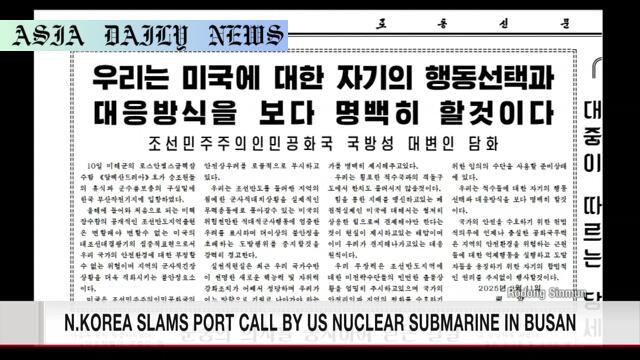North Korea: Escalating tensions as Pyongyang denounces a U.S. nuclear submarine’s visit to South Korea. Regional stability at risk.
Key Point 1: A U.S. nuclear-powered submarine arrived in Busan, South Korea, sparking criticism from North Korea.
Key Point 2: North Korea accused the United States of neglecting its security concerns and warned of potential repercussions.
Key Point 3: The event raises tensions in the region, with Pyongyang suggesting they will act against any perceived provocations.
Key Point 4: Observers suggest this could be a test of U.S. strategy under President Donald Trump.

The Arrival of the U.S. Nuclear Submarine
On Monday, a nuclear-powered U.S. submarine made a port call in the southeastern South Korean city of Busan. This visit marks a significant event in the already tense geopolitical landscape of the Korean Peninsula. South Korean officials welcomed the submarine’s docking, describing it as part of ongoing efforts to maintain regional security and display strength amid increasing military threats from North Korea.
North Korea’s Strong Reaction
North Korea reacted swiftly and emphatically to the submarine’s presence. As reported in the Rodong Sinmun, the mouthpiece of the ruling Workers’ Party, a spokesperson for Pyongyang’s defense ministry condemned the United States. The statement accused Washington of disregarding North Korea’s security concerns and labeled the port call as a deliberate provocation aimed at escalating regional tensions.
The spokesperson also issued a sharp warning, stating that North Korea’s military reserves the “legitimate right” to take retaliatory steps against any acts it deems as threats to the nation’s security. Additionally, they accused the U.S. of creating instability in the region through such actions.
Context in U.S.-North Korea Relations
U.S.-North Korea relations have been fraught with volatility, particularly during the Trump administration. While the American president repeatedly stressed his willingness to reengage diplomatically with Pyongyang, concrete progress has often been undermined by mutual distrust and provocations. This latest development might be viewed as North Korea testing American resolve, or it could simply be a continuation of its ongoing strategy of leveraging military tension for geopolitical gains.
Analyzing the Broader Implications
This episode underscores the broader tensions on the Korean Peninsula. The United States, in collaboration with its ally South Korea, continues to emphasize the importance of military deterrence against the North’s nuclear ambitions. Meanwhile, North Korea perceives such actions as hostile maneuvers that threaten its sovereignty.
Observers note that the deployment of the U.S. submarine is not just a standalone event but part of a broader strategy to demonstrate power and provide assurance to allies in the Asia-Pacific region. However, these moves risk further exacerbating tensions, feeding into a cycle of provocation and retaliation that hampers efforts toward dialogue and peace.
Potential Pathways to De-escalation
Experts have long argued for the need for sustained diplomatic engagement to resolve the Korean Peninsula’s security issues. While military demonstrations may provide short-term deterrence, they do little to address the underlying causes of tension. Regional stability is unlikely without addressing both North Korea’s security concerns and its nuclear weapons program.
For negotiations to succeed, mutual trust and compromise will be essential. The international community, particularly key players like China and Russia, may also need to play a more active role in fostering dialogue.
Conclusion
The U.S. nuclear submarine’s port call in Busan and North Korea’s heated reaction have once again spotlighted the precarious state of regional security in East Asia. While these developments showcase the depth of mistrust and discord between the two nations, they also reaffirm the urgent need for measured, diplomatic solutions. The path forward will likely require careful balancing of security commitments with efforts to de-escalate tensions and engage in meaningful dialogue.
Commentary
The Complexity of Geopolitics on the Korean Peninsula
Recent events involving the U.S. submarine’s docking in South Korea and North Korea’s heated response underline the intricacies of geopolitical tensions in East Asia. While the United States may view such actions as a necessary demonstration of commitment to its allies, these moves are inevitably seen as provocations by Pyongyang, leading to an ever-deepening cycle of hostility. Both sides accuse the other of destabilizing the region, but neither appears willing to take the first step toward easing tensions.
The Role of South Korea in the Power Balance
South Korea’s position in this dynamic is particularly noteworthy. As a close ally of the United States, it benefits from Washington’s military backing, which serves as a deterrent against North Korea’s threats. However, this alliance also places Seoul in a precarious position, often bearing the brunt of Pyongyang’s retaliatory rhetoric and actions. The constant balance between ensuring national security and avoiding an escalation in hostilities is a tightrope walk for South Korean policymakers.
Seeking Long-Term Solutions
Ultimately, the repeated episodes of military posturing and retaliatory declarations highlight the need for long-term diplomatic solutions. While deterrence may provide temporary stability, sustainable peace on the Korean Peninsula will require addressing the root causes of mistrust and hostility. Stakeholders must prioritize dialogue over displays of military strength and work collaboratively to chart a path toward reconciliation.


